Menu
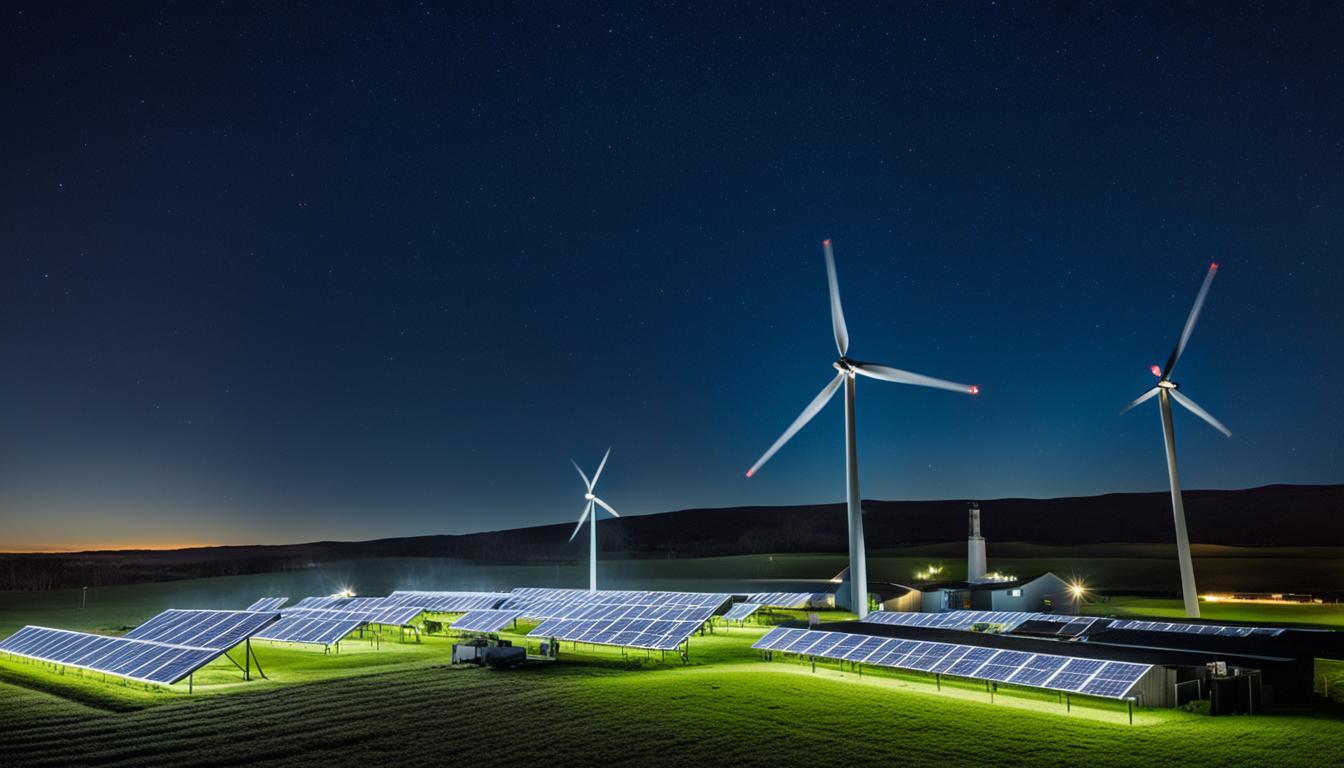
Did you know agriculture brought in $992 billion to the US in 2015? This shows how important steady power is for farming. Power cuts can mess up farm work, causing delays and maybe even losing products. This is where farms need emergency power solutions.
Foley Power Solutions have many power products for farms. They make sure farmers always have power, especially in the countryside where outages are more common. They know farms need power all year, so they have standby and rental generators. These help keep farms running smoothly, from dairies to greenhouses.
They don’t just sell generators. They do everything from the start to regular check-ups. Foley helps farms work without worry, focusing on making food well and without harming the planet.
Farms need constant electricity to function well. A sudden outage can hurt their work a lot. Having a reliable backup power system on farms is vital for making sure they stay profitable and productive.
Power outages are costly for farms. They can stop machines and irrigation, which then harms or delays crop growth. This is why a good backup power system on a farm is a must-have.
It can also stop computerised dairy systems, messing up milking times. Without cold storage, milk can spoil. Meeting the NFPA 110 standards for emergency power helps prevent these problems, keeping the farm going smoothly.
Without power, irrigation stops and crops can suffer. Post-harvesting storage needs power too, to keep crops from spoiling. Having a backup power system ensures crop production stays on track.
To meet NFPA 110, farms need to plan for fuel well. They should have more fuel than usual to prevent issues, especially in quake-prone zones. This kind of thinking keeps the farm up and running even during long outages.
“The implementation of NFPA 110 standards, which includes on-site testing and a two-hour load test, ensures that emergency power systems are capable of handling farm operations during outages.”
Just setting up a generator is not enough to handle power outage problems. Farms need to plan and set up power solutions that match their needs. This helps protect their plants and animals from harm.
| Challenge | Solution |
|---|---|
| Power disruption affects irrigation and harvesting | Install reliable emergency power systems |
| Potential spoilage of stored milk products | Ensure cold storage with backup generators |
| Compliance with NFPA 110 standards | Follow fuel sizing and storage requirements |
Dealing with power outage challenges is about having good emergency power solutions. By sticking to standards and using the right plans, farms can overcome power problems. This keeps them safe and productive.
Keeping the power steady is key for farms today. They use a lot of electric systems, like for growing crops and taking care of animals. Having a backup power system is vital. It keeps everything running so there’s no loss in productivity or operations.
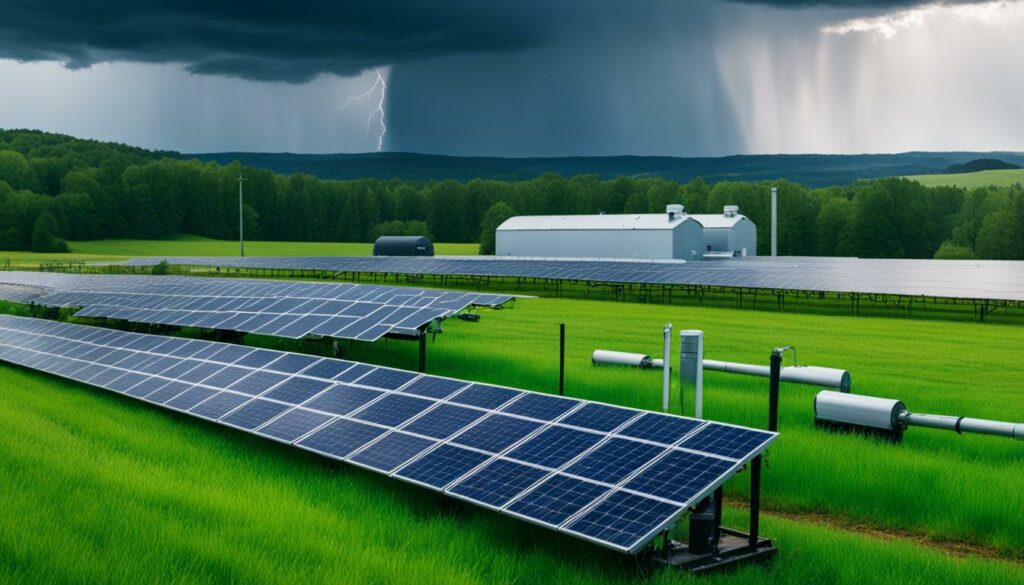
Diesel generators are a top choice for backup power on farms. They work well and provide steady power when needed most. Farms rely on them to keep automated systems going, like lighting, irrigation, and ventilation. This is key for not only crops but also for the health of animals.
Animals at dairy and poultry farms count on these systems for life support. So, diesel generators are essential to avoid any power interruptions there, too.
Gas generators are another good option, especially if you have natural gas or biogas. They are cost-effective and cleaner than diesels. Every time you use biogas from farm waste in a gas generator, it’s almost like getting power for free.
Going for biogas means you save money and help the planet by cutting down on harmful emissions and waste problems.
Solar power is a green choice for farms. It’s perfect in sunny areas and fits right into farm life. The Shocklee family farm is a great example. They use solar power for their chickens, showing how well it works in farming.
In the end, whether it’s diesel, gas with biogas, or solar, each has its own benefits. They meet different needs and help farms reach their environmental goals. With more power outages happening, having a good backup is essential for farms.
In today’s farming world, standby generators play a vital role. They keep everything running smoothly without the need for panic. These generators stop sudden power cuts from causing chaos.
Farming now relies heavily on tech, from feeding livestock to controlling the greenhouse. Interruptions mean big losses. Continuous operation is key. Standby generators help by providing power to essential areas like poultry farms and dairies.
Protecting farming tools and food during blackouts is crucial. Without power, crops might not get water, greenhouses might get too hot, and milk might go bad. Standby generators keep these things going, saving both gear and food quality.
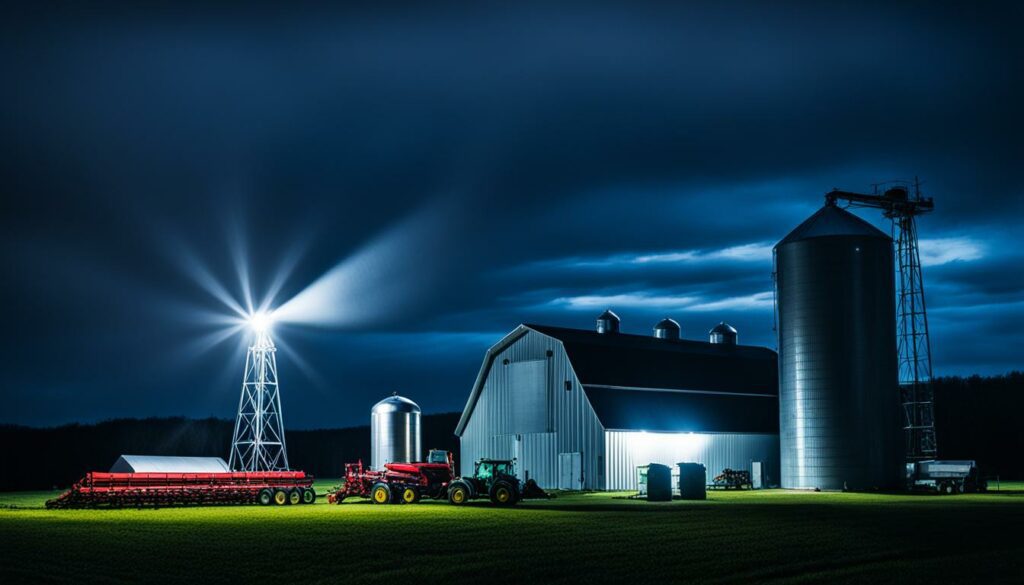
In the farming world, a steady power flow is crucial. Aggreko, a top emergency power provider globally, keeps farms running smoothly. This is key for dairy farms and greenhouses, ensuring their operations go on without hitches.
Dairy farms use dairy farm generators to stay connected. They power the tech that cares for cows and runs milking machines. Without power, milking routines and milk cooling could get ruined. Emergency power helps dairy farms stay productive and keep their milk fresh.
For greenhouses, emergency power is a big plus. Combined heat and power (CHP) bring power and heat, helping plants thrive and saving money. Constant power means growers can control the perfect environment for their plants, even during blackouts.
Here’s a look at how some industries use backup power:
| Sector | Application |
|---|---|
| Hydro Plants | Temporary power to keep gates and spillways operating during outages. |
| Solar Plants | A/C load bank testing for pre-commissioning and commissioning purposes. |
| Wind Farms | Testing, certification, and startup of wind turbines when grid power is unavailable. |
| Waste Water Facilities | Critical backup power during unplanned outages. |
| Transmission and Distribution | Temporary power fleets to restore power during emergencies caused by severe weather or natural disasters. |
Choosing a generator for farming needs careful thought. You must consider your farm’s power needs, the type of fuel available, and how easy it is to install and maintain. This ensures your farm can keep running smoothly.
Know how much power your farm needs is the first step. Different equipment needs different amounts of power. It’s important to match the generator’s power output to what you need. For example, if you use electric motors, know they usually need 4,000 watts to start and 1,000 watts to continue running for each horsepower.
Think about what fuel the generator uses and how easy this fuel is to get. Diesel generators need less maintenance than natural gas ones. Diesel generators have their own fuel tanks, while natural gas ones use a piped gas supply. Handling diesel is generally safer than natural gas too.
Putting the generator in the right place is key to its performance and your safety. Make sure you have space for it and consider a concrete pad for outdoor units. Adding an Automatic Transfer Switch (ATS) means it can turn on automatically if the power goes out. Don’t forget, regular maintenance is crucial for the generator to work when you need it.
Modern farms need reliable power solutions for daily work. These solutions are vital for keeping goods safe. Foley Power Solutions helps by offering off-grid power options.
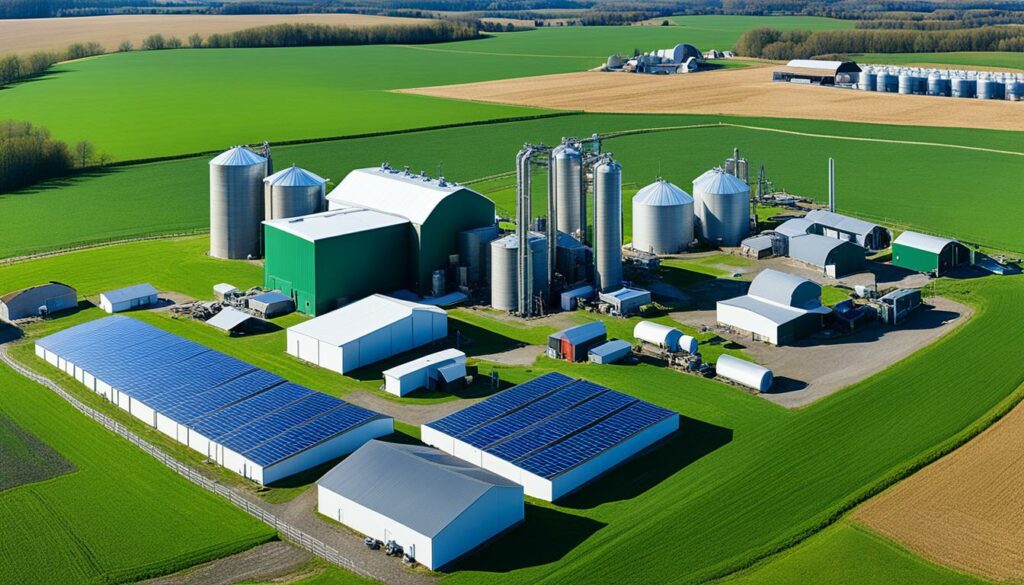
Dairy farms need stable power for milking and tracking. If power goes out, there can be big problems. Livestock places also must have power for keeping animals in good condition.
Greenhouses use Cat CHP systems to save money and help plants. And aquaculture farms rely on generators to keep ponds healthy for fish.
Foley Power Solutions has generators for all needs. They also rent out equipment for short uses. This is key during busy times or emergencies.
In 2019, U.S. agriculture made $1.109 trillion, with farms adding $136.1 billion. Good off-grid power is crucial, not just for farming but for the whole economy.
Cat and Foley support farms with maintenance, monitoring, and finance help. With power cuts increasing, these steps are vital to avoid big problems.
Looking at how backup power systems are used in real life can teach us a lot. It shows the best ways to make sure different farms and businesses have the energy they need. For example, we’ll look at how a dairy farm in Idaho and a pork producer in Iowa used backup power systems.
Bettencourt Dairies in Idaho uses renewable biogas for its power. This method helps them keep the lights on and stay warm. It shows how using biogas is good for the environment and the farm’s budget. Their success is a model for other farms to follow.
In Waverly, Iowa, the Rathe family’s pork operation stands out. They use a mix of diesel and gas systems for power. This keeps their operation running well, even as they need more energy. Their system is both reliable and good for the planet, proving that microgrids are a smart choice for farms.
mtu power generation solutions are key for ensuring farms have power when they need it. They show how important it is to have the right energy plan for farming. This way, farms can be both strong and green.
| Case Study | Location | Energy Solution | Benefits |
|---|---|---|---|
| Bettencourt Dairies | Idaho | Renewable Biogas Energy | Reduced emissions, low lifecycle costs, reliable power |
| Rathe Family | Waverly, Iowa | Microgrid Installation | Dependable energy supply, cost-effective, environmentally friendly |
EnTech Solutions leads the way in sustainable power options. They help meet the changing needs of both businesses and communities. The company has finished many energy projects, showing they value innovation, teamwork, and helping society.
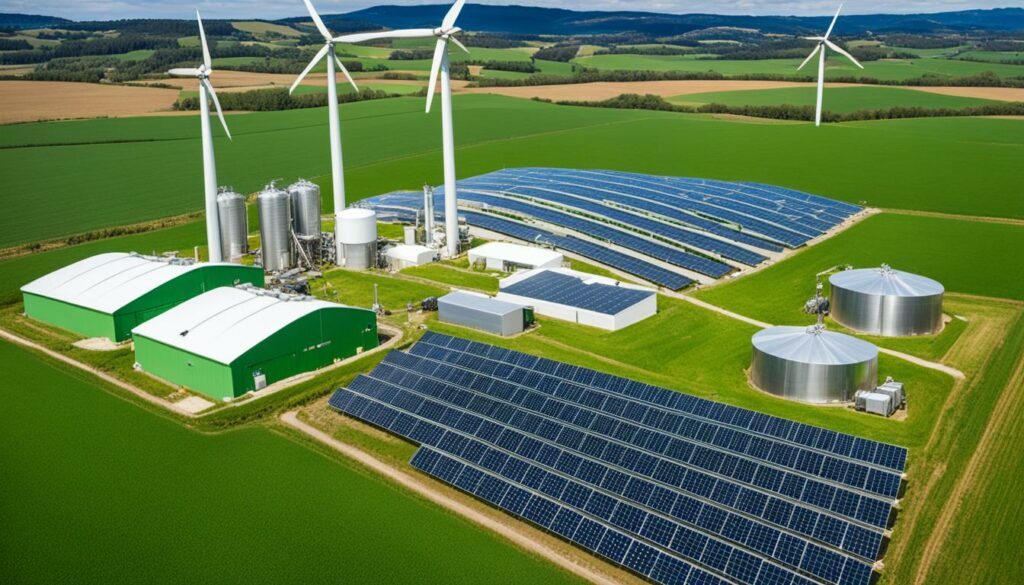
Biogas generators make great use of sustainable power options. They turn farm waste into biogas, cutting down on harmful emissions. EnTech Solutions points out the big advantages of using biogas. It turns farm and greenhouse waste into energy and natural fertiliser. This not only powers operations but also boosts sustainability.
EnTech Solutions’ microgrid solutions are made to fit specific needs. They provide steady and efficient power. These solutions can be as simple as battery storage or as complex as combining different power sources. For example, the Rathe family’s pork farm proves how effective these microgrids are. They ensure there’s always power available. EnTech Solutions is committed to developing these solutions. They aim to help businesses achieve energy independence and meet their financial, operational, and green goals.
EnTech Solutions keeps improving how businesses use and save energy. Biogas generators and microgrids are key in making renewable energy a success. The company’s wide range of services includes designing electric vehicle (EV) charging stations and creating RNG solutions. They are dedicated to bringing cleaner, smarter, and more dependable energy to their clients.
Effective agricultural work relies on a steady power supply. Mobile generators are key to meeting farm energy needs on the move. They keep farm work going, from planting to harvest, and also in emergencies. Due to more weather-related power cuts in the US, their use is increasingly important. Around 75% of farms use them, showing their vital role.
Agriculture is a big part of the U.S. economy, making $1.109 trillion in 2019. It employs lots of people, with farms alone supporting 1.3% of the workforce. So, keeping farms powered is very important. Many power cuts happen because of bad weather. For farmers, especially those growing crops or raising animals, generators are essential.
Many farms have seen real benefits from using generators. They’ve cut costs by 20% and made more money by working longer hours. This shows how generators boost productivity and help crops grow better. More and more farms want tailor-made energy solutions.
| Farm Power Statistics | Details |
|---|---|
| % of Grow Farms Using Generators | 75% |
| Operational Cost Savings | 20% |
| Annual Revenue Increase | 15-30% |
| Emergency Preparedness Success Rate | 90% |
| Adoption Rate Over Past 5 Years | 40% |
All kinds of farms need steady power for their machines. Mobile generators are great for these needs. They reduce crop damage and keep farms running during disasters. Foley Power Solutions specializes in generators for agriculture, offering many solutions.
In the end, mobile generators are crucial for today’s farms. They provide essential backup power, keeping agriculture going strong. This helps avoid losses and keeps the industry stable.
Livestock farms depend a lot on electricity to keep their animals safe and healthy. It’s vital to have plans in place to keep the power on. This is especially important when bad weather or other issues cause the electricity to go out.
Fashioning breathable air is crucial for animals’ health. Farm’s heating and cooling systems need power to work. Imagine the ice storm of 1998 or the blackout of 2003. Many farmers were without power for days. This put their animals in danger. Using generators as backups can help keep the air right for the animals.
Automatic start-up for generators can really help. It means power kicks in without people needing to switch it on. Making sure professionals install and look after the generators makes them more reliable. Placing the generator on a solid base and adding rubber pads stops it shaking too much. This keeps the systems running smoothly.
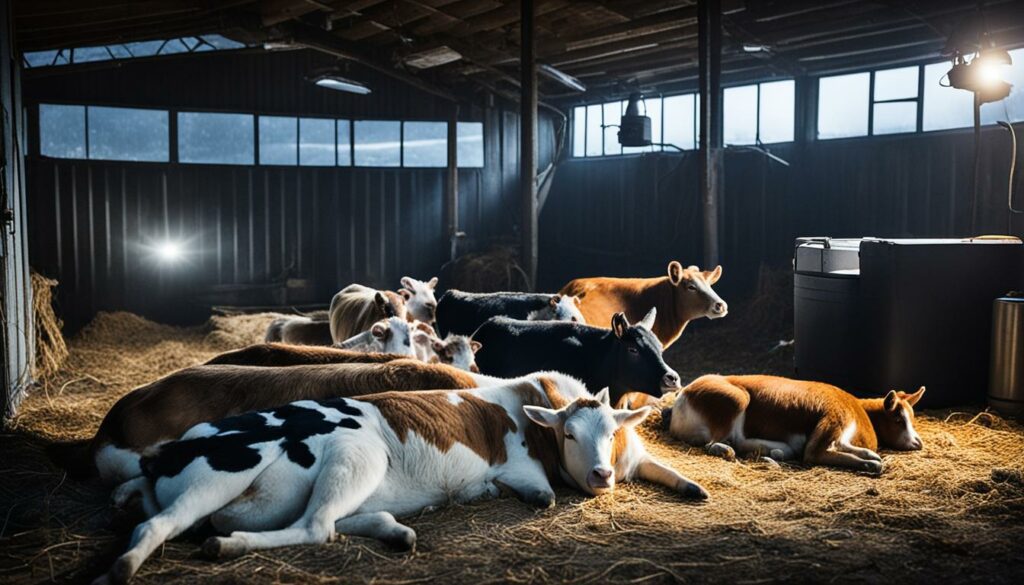
Water is another must-have. Animals need it to live and stay healthy. If the power goes out, water can stop flowing. This makes the animals thirsty and unhappy. Big farms might use machines to move the water. These need a lot of power to start and keep running. Having a generator ready is very important, even insurance companies say so.
But it’s not just machines. Having hand pumps and other ways to get water is smart. Along with a backup generator, these extra water sources can save the day.
To stay safe, stock up on food, water, and medicine for your animals. Use things like microchips to keep track of them. This is very important if there’s a need to move them fast and safely.
So, making sure the farm has enough power during emergencies is key. It keeps the animals safe and the farm working well.
Improving energy use on farms not only saves money but helps the planet too. Peterson Power Systems, Inc. has shown how optimising power can be a game-changer. It’s about using energy smartly, making the most of every unit.
Renewable energy sources like solar panels and wind turbines are great for farms. They let farms make their own clean power. Solar power is becoming popular, cutting down farm electricity costs. Wind turbines do the same by turning wind into electricity.
Farmers can make extra cash by selling unused electricity or sharing it. This approach looks at energy use in a whole new light. Using biofuels means relying less on things that run out, which is good for business and the environment.
Federal and local programmes give big financial boosts. The Rural Energy for America Program (REAP) helps with costs, sometimes paying for half. Combining loans and grants can cover as much as three-quarters of the bill. This makes going green easier for many farms.
Local and national schemes help too. The Agriculture Energy Efficiency Rebate Scheme and the Bioenergy Program make it easier and cheaper to go fuel-free. There are also tax benefits for using the sun to power things, reducing tax bills by 30%.
New tech plays a key role in saving energy. For instance, putting variable speed drives (VSDs) on pumps can cut energy use. The University of Maryland found tuning up tractors saved a lot of diesel. In fact, they used almost 15% less fuel but worked 11% better.
Simple steps like min-tillage save fuel too. Insulating buildings and machinery helps reduce waste. Planning to swap old for new wisely is also very smart. It keeps the efficiency ball rolling.
Looking into grants and help for green updates, such as the Victorian Energy Upgrades, can ease the cost. Combining different green energy sources and using batteries makes a strong energy network. It’s all about working together for a brighter, greener future.
| Energy Solution | Benefit | Consideration |
|---|---|---|
| Solar Power | Reduces electricity bills | Initial setup cost |
| Wind Turbines | Captures renewable energy | Location suitability |
| Biofuels | Reduces non-renewable dependence | Availability of crops |
| Variable Speed Drives | Increases pump efficiency | Retrofit investment |
| Insulation | Energy savings | Comprehensive coverage |
Remote monitoring has changed how we manage power on farms. With the latest tech, farmers can watch and improve their power systems. This makes sure work goes on without a hitch and problems get fixed fast.
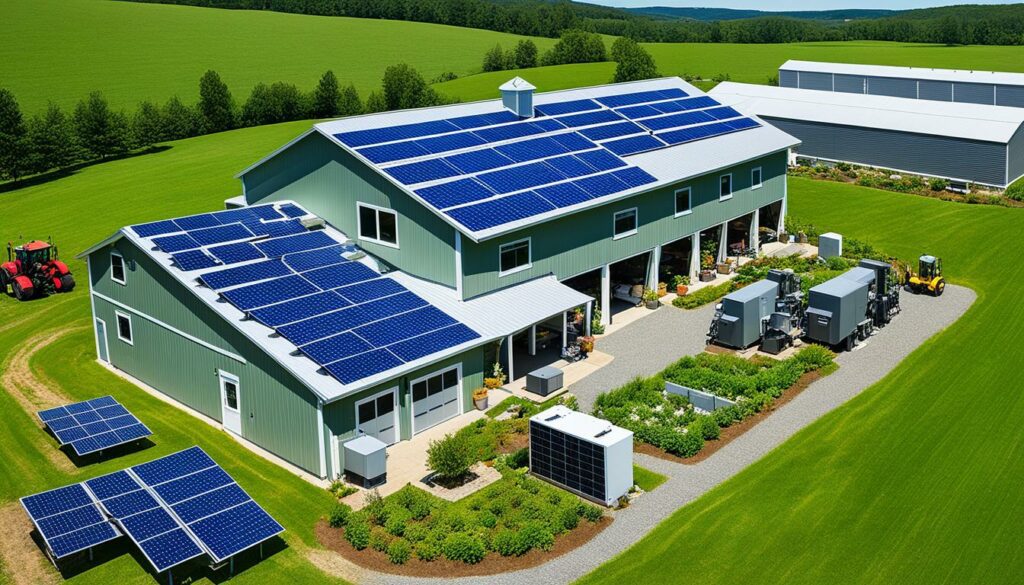
There are lots of good things about remote monitoring. It helps spot and deal with problems early, preventing big costs or work stopping. This makes power use more reliable and gear last longer.
Cat Connect offers tools to keep an eye on power systems from afar. These tools help farm workers gather important data. They can then check on how well things run, and improve work with smart decisions.
Using these advanced tools makes running power systems better. It also helps farms to work smarter and greener. They are a must for farming these days.
Agriculture is critical for the US, adding $1.109 trillion to the GDP in 2019. Power outages are growing, making reliable agricultural generators a must for farmers. Choosing the right service provider is key. It’s not just about the product at first. It’s about ensuring the farm can keep running smoothly. This involves checking various factors for sustainability and continuing operations.
When picking a generator service provider, many factors come into play. Look at the range of products they have. Check if they can fit solutions to your farm’s specific needs. Ensure speedy project delivery too. Companies like Foley and Peterson are known for offering a wide variety of generators. They have models from diesel to solar. The best provider can tailor the right generator for your farm, balancing efficiency and cost.
After buying a generator, after-sales support is crucial. Farms need steady power for tasks like feeding animals or running greenhouses. Foley and Peterson stand out with their full after-sales care. This includes repairing, changing parts, and keeping up with maintenance. Such help minimises power problems, keeping the farm’s work smooth and profitable. To keep your farm going without hitches, a reliable generator provider with great after-sales care is a must.
On farms, standby generators are common. So are diesel and gas types. They also use mobile setups for work in the fields. And there’s solar power for eco-friendly energy. These standbys keep farm work going, even if the power’s out.
They can stop machines from harvesting and watering fields. This causes delays and can harm crops. Backup power is needed to keep things running. It protects crops and keeps the farm working.
Diesel, gas, and solar generators work well on farms. Each type has its bonuses, depending on what the farm needs. Professionals like Foley Power Solutions can advise on the best choice.
Standby generators help keep essential farm jobs going. They make sure things like feeding livestock or running greenhouses are not interrupted. This protection keeps farm products safe and healthy.
Unbroken power is crucial on dairy farms for milking and tech that looks after cows. Backup units prevent milk from spoiling and keep animals well.
Farm’s power needs and the type of fuel available are key. So is making sure setting up and upkeep are practical. Companies like Foley give the right advice on picking a generator.
They sure can. Backup systems, like generators, keep farms running without the main power grid. They provide consistent power, supporting farm practices both on-grid and off.
Yes, some farms use solar and biogas for power. The Shocklee farm and Bettencourt Dairies show how backup power works for a reliable, green operation.
Biogas units turn farm waste into energy and fertiliser. Microgrids offer custom power, making farms more eco-friendly and dependable.
Mobile setups give power where and when it’s needed, like during planting or in emergencies. Foley Power Solutions provides these, tailored for farming.
By keeping the air, temperature, and water right with generators. This prevents harm or loss to the animals.
Using systems that save energy, like cogeneration, lowers costs. Peterson Power Systems, Inc. helps with solutions for better energy use and eco-friendliness.
Systems like Cat Connect help spot and fix power problems fast. This keeps the farm running smoothly and saves money on repairs.
Think about a provider’s range of products, the ability to customise, and being reliable. They should also be good at keeping projects smooth and offer help afterwards. This prevents power troubles down the line.